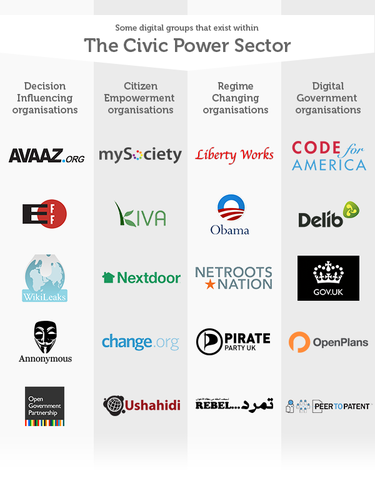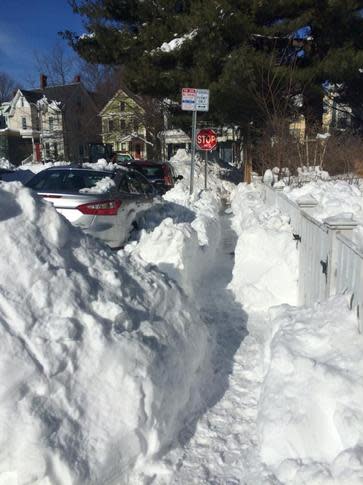Civic tech in 2015: $6.4 billion to connect citizens to services, and to one another

Screenshot of ClearStreets.org
As is true all around eastern Massachusetts, record-setting snowfalls have shrouded our neighborhood in Cambridge with several feet of snow. We've now gotten 53" of snow this year, with more yet to come. The experience of digging out brought me back to our first winter in the District of Columbia in several ways, when the historic "Snowpocalype" storms dropped several feet of snow on the nation's capitol, shutting down the city of "northern charm and southern efficiency" for weeks in 2009.

A snowplow in Cambridge, Massachusetts.
Image: Alex Howard
One of the interesting innovations that came out of "Snowmageddon" that winter was an online snowmap where residents could plug in addresses to a website to see the city's response to the weather. In the years since, other cities have launched similar maps, including Chicago's Snow Plow Tracker in 2012 and New York City's PlowNYC in 2013. This winter, just in time for all the snow, Boston launched its Snow Stats website.
Each of these websites represents a step in the evolution of government software, where an agency, state, or municipality leverages the internet to provide its residents more insight into the delivery of services and the business of government.
Over the last decade, I've spent a lot of time writing about the intersection of technology, government, and society (including my columns here), meeting the creators of new startups or apps and documenting their successes and failures. In recent years, I've seen increasing interest not only in most trade publications and the government technology press about citizen-facing services but in mainstream media. Much of that was catalyzed when the Obama administration rolled into office in 2009 on a wave of optimism about electronic democracy fueled by the internet.
Over the last six years, many of those hopes and dreams have foundered upon the rocks of partisan reality, ineptitude, and entrenched culture around the world. During that same time period, however, significant advances have been made in the release and use of data, mobile devices, cloud computing, social media, and open source software in and by government. Underneath the buzz about mobile apps and Facebook pages, there are signs of genuine change, embodied in the UK by the Government Digital Service and in the US by 18F, the Consumer Financial Protection Bureau, and the U.S. Digital Service.
Public-facing digital services have increasingly been given a new name in recent years: "civic software." Increasing interest in the space has been driven not only by potential and the buzz of new, shiny apps and mobile devices but by money: according to a 2013 study on civic tech by Quid commissioned by the Knight Foundation, more than $431 million dollars has been invested in the area since 2008 in the US.
In 2014, a $23 million venture fund called Govtech Fund launched that is focused upon government tech. More broadly, according to a recent study by IDC sponsored by software company Accela, more than $6.9 billion will be spent in the civic tech sector in 2015. That's still just a piece of the estimated $140 billion spent annually on government technology in the US alone every year, but it's an interesting one.
The blurred lines between consumer tech, government tech, and civic tech can be confusing at best and, at worst, cynically exploited by vendors looking to piggyback upon the latest tech trends and politicians interested in rebranding existing e-government efforts as open government or civic engagement. It doesn't mean there isn't crossover or that such systems aren't critically important to improve.
People with power, influence, and money in society can frequently find ways to circumvent bad technology and long lines, while the poor and disabled are forced to use whatever has been created. I thought Ezra Klein captured this dynamic well in 2013, when he dug into the deeper issues behind the disastrous relaunch of HealthCare.gov:
" ...one privilege the insured and well-off have is to excuse the terrible quality of services the government routinely delivers to the poor. Too often, the press ignores -- or simply never knows -- the pain and trouble of interfacing with government bureaucracies that the poor struggle with daily. That can allow the problems in those bureaucracies to fester. "
That dynamic and the underlying issues with entrenched government IT vendors whose core competence is getting more contracts led some independent observers to step back and question whether a given instance of "civic tech" is serving the interests of citizens and communities, or whether there are other forces at work.
For instance, Nathaniel Heller, the managing director at Results for Development, holds that the "sharing economy" is not civic technology. While companies like Airbnb may take on roles in communities hit by disasters, Heller is skeptical of calling that action "civic."
"Airbnb is in business to make money off of people renting out their spare rooms, not to strengthen the social fabric of local communities, enhance voter engagement, or provide tools for public monitoring of government," he wrote in 2013, when he was the executive director of Global Integrity. "The 'collaborative consumption space' is one of for-profit ventures, not traditional co-ops. While citizen-to-citizen sharing is indeed involved, the mission of these companies is focused on maximizing profit for their investors, not any sort of experiment in building social capital."
Where this gets especially tricky is when consumer technology startups claim that their businesses or services have beneficial effects on communities. For instance, last week the on-demand car service Uber claimed credit for a drop in drunk driving in California.
"Since we launched uberX in California, drunk-driving crashes decreased by 60 per month for drivers under 30," David Plouffe, the former campaign manager and White House advisor of President Barack Obama, wrote. "That's 1,800 crashes likely prevented over the past 2 ½ years." On the one hand, it's quite possible that young people under the influence chose to order a ride home instead of driving. On the other, the evidence supplied to support this assertion isn't as strong as one might hope, as Ryann Grochowski Jones reported at ProPublica.
On a different front, Uber has also begun sharing anonymized trip data with urban planners in Boston, with the aim of improving traffic flows and future building. While such data analysis could clearly prove useful, it's debatable whether the action of donating it makes Uber "civic technology," any more than AT&T or Verizon donating mobile user data that tracks the movement of people around cities would be. At an even deeper level, the rise of many of these startups that connect on-demand labor to demand are reshaping how we work, learn, socialize, and live, inevitably challenging existing social contracts.
What clearly is civic technology, however, are uses of data and the web that provide people with insight into how power or taxpayer-funded resources are being applied in ways that may have been assumed but often went undocumented before. They're also upgrades of old legacy systems that don't reflect how the people they serve actually live, from websites that aren't designed for mobile access to paper-based systems.

mySociety's Tom Steinberg
Image courtesy of mySociety
Tom Steinberg, the founder of mySociety, defines civic technology by outcomes: that which "spurs citizen engagement, improves communities and makes governments more effective." MySociety, a decade-old nonprofit based in the UK, is a world leader in creating digital tools and platforms that seek to "meaningfully lower the barriers to taking the first civic or democratic steps in a citizen's life, at scale." MySociety has created tools to track Parliament, make freedom of information requests, request street repairs, track mass transit, and more. Recently, mySociety has been building Poplus, an approach to building civic software that breaks it down into open source components.
I tend to think of civic tech as any tool or process that people as individuals or groups may use to affect the public arena. In September 2014, TechPresident executive editor Micah Sifry suggested four categories for civic technology, riffing on the taxonomy Steinberg created.
"Decision influencing organizations that try to directly shape or change particular decisions made by powerful individuals or organizations.
Regime changing organizations that try to replace decision makers, not persuade them.
Citizen empowering organizations that try to give people the resources and the confidence required to exert power for whatever purpose those people see fit, both now and in the future.
Digital government organizations that try to improve the ways in which governments acquire and use computers and networks. Strictly speaking this is just a sub-category of 'decision influencing organization', on a par with an environmental group or a union, but more geeky."

Image courtesy of Tom Steinberg
In my admittedly biased opinion, TechPresident remains the best place to track civic tech, along with the politics that swirl around how technology is used or built. (Disclosure: I am an occasional contributor to that publication. I'm excited about the new Civic Quarterly, too.) Sifry, the executive editor of TechPresident, was the first writer in the US I saw highlighting the potential of social software made by Loomio. For instance, in the past six months TechPresident covered how Front Porch Forum connects communities online, how NationBuilder helps organizations build and mobilize, and highlighted how a programmer, Arion Hardison, is building and crowdfunding CopScore, a tool for rating law enforcement officers. My most recent piece on TechPresident focused upon how Brigade is taking shape, digging into the prospects for a new, venture funded private social network to improve civic engagement in the US.
Whether or not you like how Brigade is shaping up, with respect to customers, products, and citizens, there's clearly an opportunity to connect people in different ways than we are already. A majority of Americans do not know their neighbors, which is why Front Porch and Nextdoor, another private social network focused on connecting neighbors, are interesting to me. Will anything change if we are better connected, particularly given the social networking fatigue many people may feel, the Facebook behemoth, and the plethora of other social apps?

Snow in Cambridge, Massachusetts
Image: Alex Howard
Here is where we come full circle, back to cities and snow removal. When Chicago launched its snowplow tracker website, enabling people to see where the plows go, it created government data that could be scraped and repurposed. As Sifry noted on Feb. 4, 2015 in his morning roundup of news on TechPresident, that's exactly what Open City, a civic hacking group in Chicago, did, creating a website that enables residents of the Windy City to see if their street has been plowed. During Chicago's last snowstorm, the data scraped by ClearStreets.org showed that the street in front of a powerful alderman's house had been visited five times, while nearby residents had yet to be dug out.
If you read through these linked stories, the common thread that differentiates civic technology from government technology is not just a focus upon citizen-facing software -- mirroring the consumer-facing software and apps that have exploded in use over the past decade -- it's a focus upon connecting people to communities and one another.
It's a focus upon building with people, not for them. It's a focus on people, not data. It's about starting with people, not technology, as Open Technology Institute fellow Laurenellen McCann wrote on Feb. 5, 2015. It's why efforts like Snowcrew.org matter: if you knew that a senior citizen or a single mother of two, just a couple blocks over from you, needed help digging out from the blizzard, would you volunteer to help?
If you have more stories about how civic technology is empowering the disempowered, please let me know. I'll be listening.
Also read
Open data, crowdsourcing, and sharing economy tech take on new roles in disasters
The sharing economy: Will self-regulation by startups suffice to protect consumers?
We-commerce: The sharing economy's uncertain path to changing the world
In Mexico, open government includes social justice, press freedom, and innovation
With Ushahidi's global innovation engine, Africa has joined the tech revolution
David Kobia: Ushahidi Co-founder. Humanitarian. Avid cyclist.

